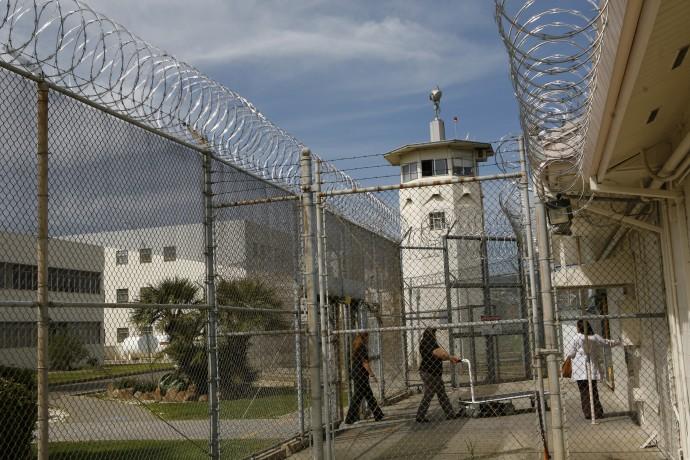
Vanguard HQ in Malvern, PA
If you think it's a good idea to turn public facilities over to private enterprises, Vanguard Group and Campus Crest Communities are on your wavelength.
But if you carry a healthy skepticism about such public-to-private ventures, you might want to think twice about these firms. That goes double if you have serious concerns about child welfare. That's because Vanguard and Campus Crest have connections that indicate they don't take the well being of children all that seriously.
In the case of Campus Crest CEO Ted Rollins, he has a documented history as a child abuser. But that does not seem to bother Vanguard, which is the No. 1 institutional investor in Rollins' company.
What does that say about the values these firms hold, and why should the public care? Well, they might someday try to provide housing for you, especially if you are a prisoner or a college student. And they clearly intend to make large chunks of money off institutions that your tax dollars support.
Is that a good thing? The Vanguard Group, based in the Philadelphia suburb of Malvern, Pennsylvania, manages $1.7 trillion in assets and is credited with creating and popularizing index funds for individual investors. Recent events, however, raise serious questions about Vanguard's values--and the values of certain companies it supports.
As we reported yesterday, one of those companies is gun manufacturer Sturm Ruger. In the wake of last Friday's massacre at Sandy Hook Elementary School in Newtown, Connecticut, stocks in gun companies are falling and some investors are distancing themselves from the industry. Vanguard, however, appears to be deeply enmeshed in a gun culture that contributed to the slaughter of 26 people, including 20 children between the ages of 5 and 10. A statement from Vanguard spokesman Doug Hoffman indicates the firm is in no hurry to alter its relationship with gun makers. Here is how Huffington Post's Chris Kirkham reports it:
A spokesman for Vanguard, David Hoffman, said the company will always appear to have a larger investment in any given corporation because it pegs investments to certain stock index funds. Therefore the investment in a company such as Sturm Ruger doesn't necessarily reflect an active position, he said.
Hoffman added that investors who invest in actively managed funds can choose to invest in a social index fund, which screens out companies such as firearms manufacturers based on "certain social, human rights, and environmental criteria."
Vanguard's culture of index funds seems to provide a convenient explanation--some might call it an excuse--for relationships with dubious enterprises. Vanguard's dubious relationships, it turns out, are not limited to the gun industry.

A CCA prison
The firm is among the leading shareholders in Corrections Corporation of America (CCA) and The GEO Group (GEO), the top private-prison operators in the country. Earlier this year, Truthout reporter Dina Rasor focused on CCA and GEO in a pair of articles with titles that say a lot about the industry. The first article is titled "Prison Industries: "Don't Let Society Improve Or We Lose Business." The second is titled "America's Top Prison Corporation: A Study In Predatory Capitalism And Cronyism."Rasor's reports paint an unflattering picture of private prisons, which Vanguard helps underwrite. From one of the Truthout articles:
Just as I have feared that privatizing the logistics of war will encourage private war-service industries to lobby for a hot war or long occupation to keep their industries viable, there has emerged a group of prison industries, state and federal legislators, and other players who will continue to benefit from our disgraceful ranking as the world's largest warden. . . .
This is an industry that needs misery, long sentences, rounded-up undocumented immigrants and increasing crime to flourish.
One bad actor who has tried to cash in on the prison-industrial complex is former Vice President Dick Cheney. How did he do it? Reportedly by investing $85 million in Vanguard Group. Cheney and former Bush Attorney General Alberto Gonzalez were indicted in 2008 in Willacy County, Texas, for alleged prisoner abuse in federal detention centers. The case against Cheney and Gonzalez languished when Juan Angel Guerra, the prosecutor who brought it, lost in a primary election.
Before leaving office, however, Guerra shined light on Dick Cheney and The Vanguard Group in an interview with Democracy Now! and Amy Goodman. From that interview:
AMY GOODMAN: Juan Guerra, the Vice President’s attorney says this is bizarre, that you had Cheney invested in Vanguard Group, which is a mutual fund that, yes, does invest in the private prison industry, but can you indict him for being responsible for abusive behavior in the prison?
JUAN ANGEL GUERRA: Well, yes, because, again, you have the activities, the criminal activities, that his involvement is that he is aware with the Vanguard Group. The Vanguard Group has invested — is invested. It’s a top ten companies that are investing in the three top private prisons companies, the private prisons. So if you follow Vanguard, then he ended up investing $85 million. The problem here is that the Vanguard Group is not part of his blind trust. This is money that he has, quote, "on the side." It is reported in his income tax with his signature there. So he knows exactly where his money is invested. If this was part of his blind trust, then he would have no control. So because he has control, so now they’re trying to increase the number, the price. Instead of $80, they’re trying to go to $120, which means that these private companies are going to end up making more money, which means that Vanguard would make more money, which means that obviously the Vice President would make more money.
A skeptic might view The Vanguard Group's business model this way: Invest in companies that make guns, which all too often are used to commit crimes. Then invest in private prisons to house the criminals you helped create.
Sounds like a winner, doesn't it?
Vanguard apparently thinks it has another winner in Campus Crest Communities, which designs, builds and markets student housing near some 40 universities around the country. The Campus Crest market consists of young people, but is Vanguard concerned that company CEO Ted Rollins has a history of abusive actions toward young people? Given that Vanguard has invested almost $47.8 million in Campus Crest, it doesn't look like it.
It's not as if the ugliness in Ted Rollins is a secret, and information on it is not particularly hard to find. Public records show Rollins has a criminal record from his conviction for an assault on his 16-year-old stepson. We also know that North Carolina social-services officials, acting on a citizen complaint, investigated Rollins for child sexual abuse of the same stepson.
Why does Vanguard seem to ignore Ted Rollins' ties to criminality? Maybe it's because the investment firm and the CEO share a vision for how private enterprises can reap huge profits from operating facilities that traditionally have been public concerns.
We will take a closer look at that shared vision in upcoming posts.
